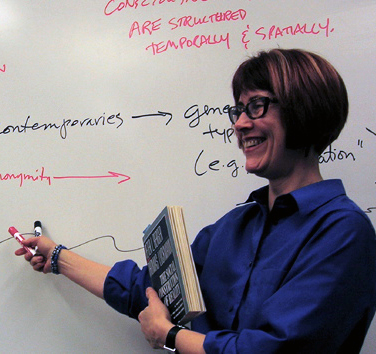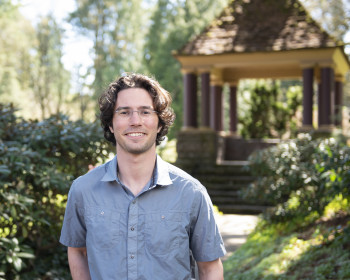Anthropology professor explores the culture of science in NIH-backed project
Open gallery

A pregnant woman who suffers trauma passes post-traumatic stress disorder to her fetus. The chemicals in plastic reshape the genes of a boy in puberty, pre-disposing him to cancer later in life. The expression of the genetic code of identical twins may become more dissimilar over time.
A scientific shift is underway that challenges the notion of a pre-determined biological nature and asks how our environment might impact our biological makeup. The field of epigenetics—which investigates how gene expression can be altered by environmental exposures, even without changes in the actual DNA—offers new opportunities to unlock biological mysteries like why some people are predisposed to certain diseases and how to treat them.
At Lewis & Clark, one researcher is considering how the interactions between science and society shape this cutting-edge field.
Deborah Heath, associate professor of anthropology, has spent nearly twenty years examining the intersections between nature and culture and between culture and science. As an anthropologist, Heath is keenly interested in how diverse cultural environments shape the ways we know the world.
“Anthropology is uniquely positioned to bridge the gap between what C.P. Snow called the ‘two cultures’ of science and the humanities,” Heath said. “My job is to understand how meaning is made and translated, to trace how knowledge that is both cultural and material circulates among scientists and other stakeholders.”
My job is to understand how meaning is made and translated, to trace how knowledge that is both cultural and material circulates among scientists and other stakeholders.
–Deborah Heath
Heath, co-editor of the book Genetic Nature/Culture: Anthropology and Science Beyond the Two-Culture Divide, has previously explored these relations between science and culture in studies of genetics and examples of food production. At the height of the Human Genome Project, Heath received NIH funding to launch a multi-sited project called “Mapping Genetic Knowledge: An Anthropological Approach.”
“The project traced how genetic knowledges emerged from the interactions among scientists, clinicians, and health advocates, all stakeholders in the aim to better understand heritable diseases,” Heath said.
Recently, Heath has examined how the work of poultry scientists and experts in fields like climatology and soil science have entered into debates about the ethics of foie gras production, as well as discussions about the taste of place captured in the notion of terroir.
Collaboration with OHSU explores multiple facets of epigenetics
Heath is now part of a network of researchers and advocates who have received approximately $450,000 in funding from the National Institutes of Health National Human Genome Research Institute for a three-year project that explores the biological, clinical, social science, legal, and community impacts of epigenetics. Based at Oregon Health & Science University (OHSU), the Interdisciplinary Center on Epigenetics, Science, and Society (ICESS) is a network of approximately 30 people that includes well-known researchers from institutions such as MD Anderson Cancer Center, Oregon Center for Environmental Health, and the University of Virginia.
Each of the five teams that comprise ICESS will investigate case studies focused on topics such as the fetal origins of adult disease; cancer prevention, diagnosis, and treatment; and the relationship between nutrition, health, and disease.
“Nutritional epigenetics sees food as a kind of environment, whether prenatally or within our surrounding landscapes, and also raises issues of health disparities that are culturally and politically significant,” Heath said, pointing out studies of the high incidence of diabetes among Hispanic and Native American populations. Heath said that this research initiative on the epigenetics of nutrition represents connections between her previous work on genetics and on the anthropology of food.
Heath joins OHSU medical anthropologist Nancy Press on the Social Science team. Geneticist Mitchell Turker, who received his law degree from Lewis & Clark Law School in 2008, with a certificate in environmental law, heads the Biology of Epigenetics team. Turker also joins Lewis & Clark law professors Henry Drummond, Dan Rohlf, and Barbara Safriet on the project’s Legal Analysis team.
How culture informs science
Heath’s engagement with the project will approach the anthropological side of the study of epigenetics.
“Epigenetics directs our attention to an interdisciplinary approach and allows for a number of ways of thinking about scientific questions,” Heath said. “Just as epigenetics is about the connections between genes and our environment, this project is creating connections linking anthropology, biology, environmental studies, and the law. And it brings scientists, clinicians, and advocates into conversation.”
This project…brings scientists, clinicians, and advocates into conversation.
–Deborah Heath
Heath also points out that where research is carried out also affects its results. In Scandinavian countries, for example, citizens play a direct role in shaping science policy. Within this epigenetic project, Heath said the advocacy sector will be brought to the table to discuss how research is carried out. For example, Native American communities will be directly involved in discussions about nutritional epigenetics, alongside the academic researchers from ICESS.
“Scientific knowledge is relational, though we often treat is as a collection of individual pieces of information,” Heath said. “This project supports efforts to think about how epigenetics research is interconnected within communities and globally.”
How the media is shaping the epigenetics story
Heath is also interested in the ways that communication technologies and mass media are playing a role in the circulation of scientific knowledge. She has written about the role of Internet forums in facilitating the work of health advocates and in shaping the public sphere within which debates about food are taking place.
Heath and her students have now begun monitoring media coverage and public discourse on popular news outlets about epigenetics. She is working on an article titled “The Emerging Epigenetic Mystique” for the forthcoming book Biosocial Becomings.
One aspect of the research examines the use of the hashtag “#epigenetics” on Twitter to investigate ways the term is being used and spread online.
“Epigenetics offers many exciting possibilities, but like any emerging trend, it’s vulnerable to hype, within both the research community and the public sphere,” Heath said. “There is a tendency for mystical thinking or marketing spin, and so tracking the ways that epigenetics is portrayed in social media can help both the scientific community and the public gain some perspective.”
Learn more about epigenetics in this video by NOVA and this podcast by Stuff You Should Know.
More Newsroom Stories
Public Relations is located in McAfee on the Undergraduate Campus.
MSC: 19
email public@lclark.edu
voice 503-768-7970
Public Relations
Lewis & Clark
615 S. Palatine Hill Road MSC 19
Portland OR 97219

